
Global economic inequality has worsened because of climate change, according to a recent study.
Stanford University researchers found that temperature changes over the past several decades have helped enrich cool countries like Norway and Sweden. However, warm countries such as India and Nigeria, are poorer than they would have been without global warming.
The study was published on April 22 in the peer-reviewed Proceedings of the National Academy of Sciences.
Climate scientist and lead author of the study Noah Diffenbaugh said: “Our results show that most of the poorest countries on Earth are considerably poorer than they would have been without global warming.
“At the same time, the majority of rich countries are richer than they would have been.”
From 1961 to 2010, the researchers estimate that global warming had a negative effect on the wealth per person in the world’s poorest countries by 17 to 30 percent.
While global economic inequality has narrowed over the past few decades, the gap could have been even narrower in the absence of global warming.
Previous research by Burke and co-authors looked at 50 years of annual temperature and GDP measurements for 165 countries to determine the effects of temperature changes on economic growth. They found that during warmer than average years, growth accelerate in cool nations but slowed in warm ones.
“The historical data clearly show that crops are more productive, people are healthier and we are more productive at work when temperatures are neither too hot nor too cold,” Burke explained. “This means that in cold countries, a little bit of warming can help. The opposite is true in places that are already hot.”
The new study builds on Burke’s previously published research with data from more than 20 climate models developed by research centers around the world. The team estimated what each country’s economic output might have been without global warming by using the climate models to isolate how much each country has already warmed.
Estimated economic impact of global warming from 1961 to 2010 across certain nations:
5 countries burdened by warming
Sudan (population 41 million): -36%
India (population 1.3 billion): -31%
Nigeria (population 191 million): -29%
Indonesia (population 264 million): -27%
Brazil (population 209 million): -25%
5 countries boosted by warming
Norway (population 5 million): +34%
Canada (population 37 million): +32%
Sweden (population 10 million): +25%
Great Britain (population 66 million): +9.5%
France (population 67 million): +4.8%
World’s 3 largest economies
USA (population 327 million): -0.2%
China (population 1.4 billion): -1.4%
Japan (population 127 million): -1.1%
“A few of the largest economies are near the perfect temperature for economic output. Global warming hasn’t pushed them off the top of the hill, and in many cases, it has pushed them toward it,” Burke said. “But a large amount of warming in the future will push them further and further from the temperature optimum.”
Citation
Global warming has increased global economic inequality
Noah S. Diffenbaugh and Marshall Burke
PNAS first published April 22, 2019 https://doi.org/10.1073/pnas.1816020116

